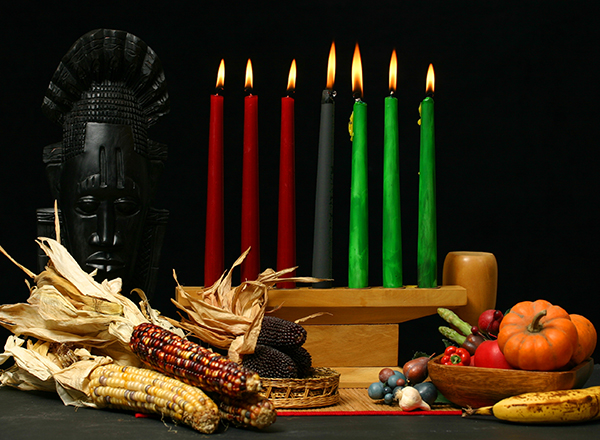Kwanzaa 2020

Dear HFC Community,
This message is one of many related to our diverse community’s numerous unique holidays, including cultural, historic, and religious observances throughout the year. I am likely to write about the holidays or cultural observances that mean the most to you as they occur throughout the year. Please let me know if you want to learn my plans about a holiday that is specifically important to you.
Starting Saturday, Dec. 26, and concluding Jan. 1, individuals and families worldwide will celebrate the holiday of Kwanzaa. I attended a virtual celebration that was held at HFC on December 2, led by Dr. Kalvin Harvell and the Black Male and QUEENS Focus Group.
What is Kwanzaa, and how did it begin?
Kwanzaa is a holiday that celebrates family, community, and culture. The holiday was created by Dr. Maulana Karenga in 1966. Dr. Karenga is professor and chair of Africana Studies at California State University, Long Beach, executive director of the Kawaida Institute of Pan-African Studies, and chairman of The Organization Us.
The word Kwanzaa, and many of the terms you will see in this message, are Swahili words. Swahili is an African language that is widely spoken in Eastern and Southeastern African nations.
Dr. Karenga concluded that Black people in the United States did not have holidays that recognized their cultures, histories, and traditions. He believed that a national holiday would be a positive step toward multicultural understanding and would give Blacks in the United States and others a deeper connection to their heritage.
Dr. Karenga combined the celebrations of several different traditions to establish Kwanzaa. The holiday began to spread, and it is now celebrated by millions of people worldwide.
I wrote in detail about this holiday last year. I encourage you to read it.
Kwanzaa means “first fruits.” The holiday focuses on what it means to be African and human in the fullest sense. Kwanzaa is a community-oriented celebration that focuses on all aspects of the family, including those who are present and those in the ancestral realm.
The seven days of Kwanzaa are a time of celebration, meditation, and recommitment. They focus on the Nguzo Saba, or Seven Principles. On each of the seven nights, the family gathers near a table containing seven Kwanzaa symbols. A child lights one of the candles on the Kinara, or candelabrum. The candles are lit each day in sequence, and the family discusses one of the Nguzo Saba principles. An African feast, or Karamu, is traditionally held on December 31.
The Nguzo Saba are central to the celebration of Kwanzaa and emerge from Kawaida philosophy, which evaluates the best of African thought and practice. Each principle represents a different day of the celebration. They include:
- Umoja, unity
- Kujichagulia, self-determination
- Ujima, collective work and responsibility
- Ujamaa, cooperative economics
- Nia, purpose
- Kuumba, creativity
- Imani, faith
Kwanzaa is also filled with symbols representing the expression of the Nguzo Saba principles. The Kwanzaa theme for 2020 is “Kwanzaa and the Well-Being of the World: Living and Uplifting the Seven Principles.”
The holiday is secular, not religious, and it is inclusive. Celebrations normally include songs and dances, drums, storytelling, and readings. Colorful art displays and clothing are encouraged.
To all who celebrate Kwanzaa, I hope you enjoy each of the seven days, surrounded by (yet socially distanced or electronically distanced from) the people closest to you.
Holiday celebrations in 2020
Many holidays take place at or near the end of the calendar year. Nearly all are festive and communal, bringing people together in groups to celebrate. This year, these holidays will be celebrated differently because of the pandemic.
The holidays remain a source of light and joy in our lives, and I encourage all in our community, no matter the cultural or religious tradition, to seek ways to safely create a sense of community and togetherness.
However you celebrate, I wish you a safe, healthy, and joyous holiday season.
Russ Kavalhuna
President
president@hfcc.edu